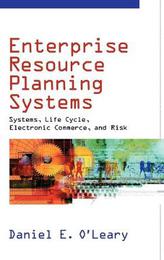
|
Enterprise Resource Planning Systems: Systems, Life Cycle, Electronic Commerce, and Risk
Hardback
Main Details
| Title |
Enterprise Resource Planning Systems: Systems, Life Cycle, Electronic Commerce, and Risk
|
| Authors and Contributors |
By (author) Daniel E. O'Leary
|
| Physical Properties |
| Format:Hardback | | Pages:242 | | Dimensions(mm): Height 235,Width 159 |
|
| Category/Genre | Business mathematics and systems |
|---|
| ISBN/Barcode |
9780521791526
|
| Classifications | Dewey:658.50285 |
|---|
| Audience | | Professional & Vocational | |
|---|
| Illustrations |
27 Line drawings, unspecified
|
|
Publishing Details |
| Publisher |
Cambridge University Press
|
| Imprint |
Cambridge University Press
|
| Publication Date |
31 July 2000 |
| Publication Country |
United Kingdom
|
Description
Enterprise Resource Planning Systems can provide the foundation for a wide range of e-commerce based processes including web-based ordering and order tracing, inventory management, and built-to-order goods. This book examines the pros and cons of ERP systems, explains how they work, and highlights their role at the heart of e-commerce. The author begins by explaining the background to ERP systems and goes on to discuss specific systems and their capabilities. He then focuses on the ERP life cycle, from initial implementation through to the time when the system goes live. After covering the use of ERP in e-commerce, he concludes by discussing the risks associated with the adoption of ERP systems. The book contains several detailed case-studies and will be an invaluable guide to managers and consultants working with ERP systems. It will also be a useful reference for MBA students taking courses in information systems management.
Reviews'The chapters are well written, with objectives, figures, and clear divisions into sections ... I highly recommend it.' Brad Reid, Computing Reviews 'The book is divided into four parts: introduction and background, ERP systems, the ERP life cycle, and electronic commerce and risk. It contains case studies, references, chapter questions, and a complete index. the chapters are well written, with objectives, figures, and clear divisions into sections. The book does not contain canned answers, but carefully walks readers through thinking about ERP systems. I highly recommend it.' Brad Reid, Computing Milieux
|